
Tigger is a fictional character in A.A. Milne's Winnie-the-Pooh books and their adaptations; an anthropomorphic toy tiger. He was originally introduced in the 1928 story collection The House at Pooh Corner, the sequel to the 1926 book Winnie-the-Pooh by A. A. Milne. Like other Pooh characters, Tigger is based on one of Christopher Robin Milne's stuffed toy animals. He appears in the Disney animated versions of Winnie the Pooh and has also appeared in his own film, The Tigger Movie (2000).
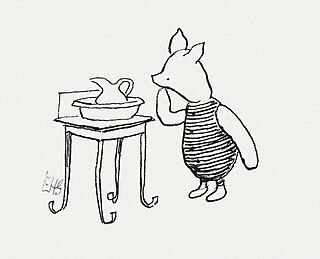
Piglet is a fictional character from A. A. Milne's Winnie-the-Pooh books. Piglet is Winnie‑the‑Pooh's closest friend amongst all the toys and animals featured in the stories. Although he is a "Very Small Animal" of a generally timid disposition, he tries to be brave and on occasion conquers his fears.

Roo is a fictional character created in 1926 by A. A. Milne and first featured in the book Winnie-the-Pooh. He is a young kangaroo and his mother is Kanga. Like most other Pooh characters, Roo is based on a stuffed toy animal that belonged to Milne's son, Christopher Robin Milne. Though stuffed, Roo was lost in the 1930s in an apple orchard somewhere in Sussex.

The Tigger Movie is a 2000 American animated musical comedy-drama film produced by Walt Disney Television Animation with animation production by Walt Disney Animation (Japan), Inc., written and directed by Jun Falkenstein from a story by Eddie Guzelian, and released by Walt Disney Pictures on February 11, 2000. It is the second theatrical Winnie the Pooh film after The Many Adventures of Winnie the Pooh and features Pooh's sidekick Tigger as the main protagonist searching for his family tree and other Tiggers like himself. The film was the first feature-length theatrical Pooh film that was not a collection of previously released shorts.
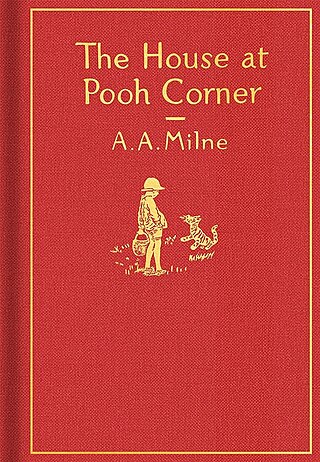
The House at Pooh Corner is a 1928 children's book by A. A. Milne and illustrated by E. H. Shepard. This book is the second novel, and final one by Milne, to feature Winnie-the-Pooh and his world. The book is also notable for introducing the character Tigger. The book's exact date of publication is unknown beyond the year 1928, although several sources indicate the date of October 11.
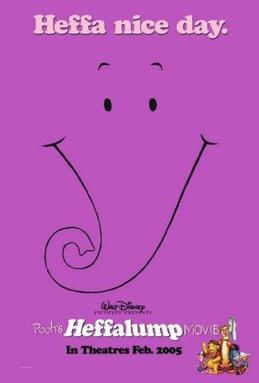
Pooh's Heffalump Movie is a 2005 American animated musical adventure comedy-drama film produced by the Japanese office of Disneytoon Studios and released by Walt Disney Pictures. Featuring characters from A. A. Milne's Winnie-the-Pooh stories, the film is the fourth theatrical animated film in Disney's Winnie the Pooh franchise and DisneyToon Studios's third adaptation of Winnie the Pooh stories, following The Tigger Movie (2000) and Piglet's Big Movie (2003). The film was released theatrically on February 11, 2005. The film was followed by a direct-to-video Halloween sequel titled Pooh's Heffalump Halloween Movie which came out seven months after the film's release.

Welcome to Pooh Corner is a live-action/puppet television series that aired on Disney Channel, featuring the characters from the Winnie the Pooh universe portrayed by actors in human-sized puppet suits, except Roo, who was originally a traditional puppet. The animatronic costumes used for the characters were created by Alchemy II, Inc., headed by Ken Forsse who later created Teddy Ruxpin. The show was first aired on April 18, 1983, the day The Disney Channel was launched. Its timeslot for its early run was at 8:30 a.m. Eastern/Pacific Time, making it the third program of The Disney Channel's 16 hour programming day. Reruns of the show aired on The Disney Channel until May 30, 1997.

Winnie the Pooh and the Blustery Day is a 1968 American animated featurette based on the third, fifth, ninth, and tenth chapters of Winnie-the-Pooh and the second, eighth, and ninth chapters from The House at Pooh Corner by A. A. Milne. The featurette was directed by Wolfgang Reitherman, produced by Walt Disney Productions and released by Buena Vista Distribution Company on December 20, 1968, being shown in theaters with The Horse in the Gray Flannel Suit. This was the second of the studio's Winnie the Pooh theatrical featurettes. It was later added as a segment to the 1977 film The Many Adventures of Winnie the Pooh. The music was written by Richard M. Sherman and Robert B. Sherman. It was notable for being the last Disney animated short to be produced by Walt Disney, who died of lung cancer on December 15, 1966, two years before its release.

Winnie the Pooh and Tigger Too is a 1974 American animated featurette based on the third chapter of Winnie-the-Pooh and the fourth and seventh chapters of The House at Pooh Corner by A. A. Milne. The featurette was directed by John Lounsbery, produced by Wolfgang Reitherman, released by Walt Disney Productions, and distributed by Buena Vista Distribution. It was released on October 21, 1974, and released again as a double feature on December 20, 1974, with the live-action feature film The Island at the Top of the World. It was nominated for an Academy Award for Best Animated Short Film, but lost to Closed Mondays.

Springtime with Roo is a 2004 American direct-to-video Easter animated musical fantasy adventure comedy-drama film produced by Walt Disney Pictures and DisneyToon Studios, and animated by Toon City Animation in Manila, Philippines.

Winnie the Pooh and a Day for Eeyore is a 1983 American animated featurette based on the sixth chapter of both books Winnie-the-Pooh and The House at Pooh Corner by A.A. Milne. Produced by Walt Disney Productions and distributed by Buena Vista Distribution, the short initially received limited release on March 11, 1983, before expanding to a wide release on March 25 as part of a double feature with the re-issue of The Sword in the Stone (1963), which it accompanied in most countries except Australia where it accompanied a reissue of Bedknobs and Broomsticks (1971). Directed by Rick Reinert, the featurette featured the voices of Hal Smith, John Fiedler, Will Ryan, Ralph Wright, and Paul Winchell.

Seasons of Giving is a 1999 American direct-to-video Christmas animated musical film which included A Winnie the Pooh Thanksgiving, and two episodes from The New Adventures of Winnie the Pooh. It features new songs by The Sherman Brothers.

A Very Merry Pooh Year is a 2002 American direct-to-video Christmas animated musical film produced by Walt Disney Television Animation. The film features the 1991 Christmas television special Winnie the Pooh and Christmas Too, as well as a new film, Happy Pooh Year. The film animation production was done by Wang Film Productions Co., Ltd., and Sunwoo Animation, (Korea) Co., Ltd.
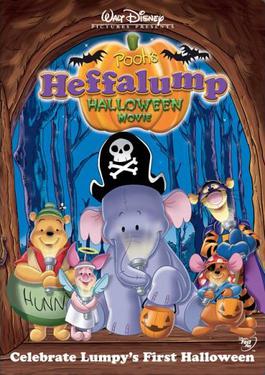
Pooh's Heffalump Halloween Movie is a 2005 American direct-to-video Halloween animated fantasy adventure comedy-drama film produced by Walt Disney Pictures and DisneyToon Studios, featuring the characters from Disney's Winnie the Pooh franchise, and it was the sequel to Pooh's Heffalump Movie. This was the final Winnie the Pooh film to be produced by DisneyToon Studios before they moved to Tinker Bell films.

Disney's Piglet's Big Game is a 2003 action-adventure game developed by French developer Doki Denki Studio and Hulabee Entertainment, and published by Gotham Games, Disney Interactive Studios, and THQ. The game centers around Piglet and how he tries to show how he can help. The game is loosely based on Piglet's Big Movie.
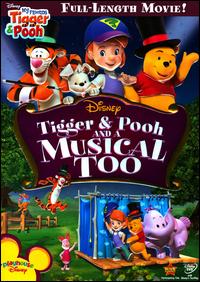
Tigger & Pooh and a Musical Too is a 2009 American direct-to-video animated musical film produced by Walt Disney Television Animation. The film is based on the hit Playhouse Disney series My Friends Tigger & Pooh. In the film, Darby, Tigger and Pooh make a musical concert for the Hundred Acre Wood.

Winnie the Pooh: A Valentine for You is a Valentine's Day special based on A. A. Milne's stories, originally broadcast on ABC on February 13, 1999. A Valentine for You was released on VHS in 2000, 2001, and 2002, and on DVD in 2004 and 2010. It was made available for streaming on Disney+ on February 11, 2022.
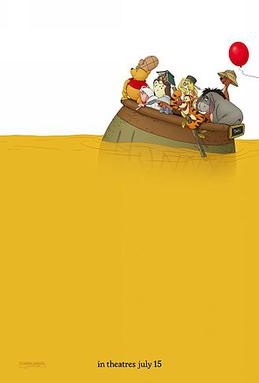
Winnie the Pooh is a 2011 American animated musical comedy film produced by Walt Disney Animation Studios and released by Walt Disney Pictures. It is based on the book series of the same name written by A. A. Milne and illustrated by E. H. Shepard. The film is a revival of Disney's Winnie the Pooh franchise and the fifth theatrical Winnie the Pooh film released, and the second in the Disney Animated Canon. It was directed by Stephen Anderson and Don Hall and produced by Peter Del Vecho and Clark Spencer, based on a story that Anderson and Hall conceived with Clio Chiang, Don Dougherty, Kendelle Hoyer, Brian Kesinger, Nicole Mitchell, and Jeremy Spears.
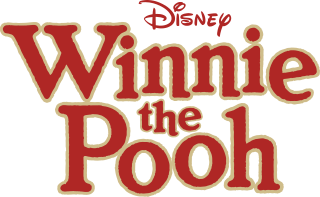
Winnie the Pooh is a media franchise produced by The Walt Disney Company, based on A. A. Milne and E. H. Shepard's stories featuring Winnie-the-Pooh. It started in 1966 with the theatrical release of the short Winnie the Pooh and the Honey Tree.


















